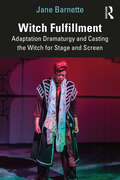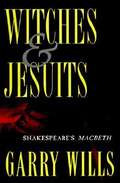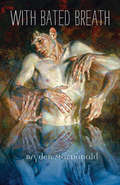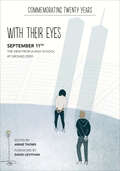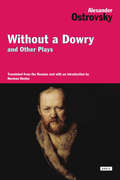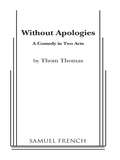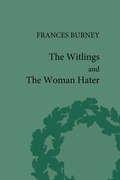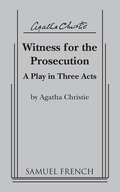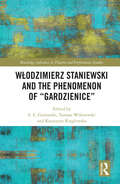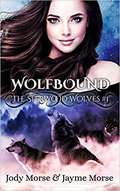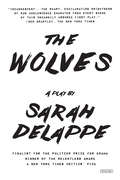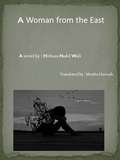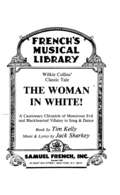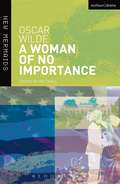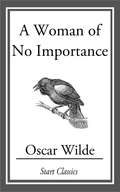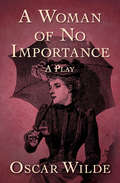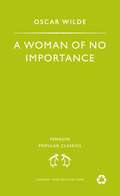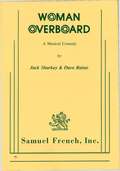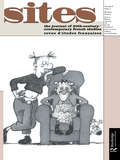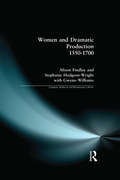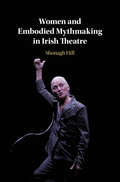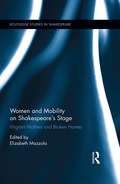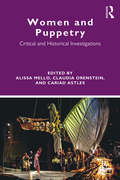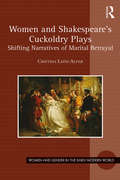- Table View
- List View
Witch Fulfillment: Adaptation Dramaturgy and Casting the Witch for Stage and Screen
by Jane BarnetteWitch Fulfillment: Adaptation Dramaturgy and Casting the Witch for Stage and Screen addresses the Witch as a theatrical type on twenty-first-century-North American stages and screens, seen through the lenses of casting, design, and adaptation, with attention paid to why these patterns persist, and what wishes they fulfil. Witch Fulfillment examines the Witch in performance, considering how actors embody iconic roles designated as witches (casting), and how dramaturgical choices (adaptation) heighten their witchy power. Through analysis of Witch characters ranging from Elphaba to Medea, classic plays such as The Crucible and Macbeth, feminist adaptations - including Sycorax, Obeah Opera, and Jen Silverman’s Witch - and popular culture offerings, like the Scarlet Witch and Jinkx Monsoon, this book examines the dramaturgical meanings of adapting and embodying witchy roles in the twenty-first century. This book contends that the Witch represents a crucial category of analysis for inclusive theatre and performance and will be of interest to theatre practitioners and designers, along with theatre, witchcraft, and occult studies scholars.
Witches and Jesuits: Shakespeare's Macbeth
by Garry WillsIn Witches and Jesuits, Wills focuses on a single document to open up a window on an entire society. He begins with a simple question: If Macbeth is such a great tragedy, why do performances of it so often fail? After all, the stage history of Macbeth is so riddled with disasters that it has created a legendary curse on the drama. Superstitious actors try to evade the curse by referring to Macbeth only as "the Scottish play," but production after production continues to soar in its opening scenes, only to sputter towards anticlimax in the later acts. By critical consensus there seems to have been only one entirely successful modern performance of the play, Laurence Olivier's in 1955, and even Olivier twisted his ankle on opening night. But Olivier's ankle notwithstanding, Wills maintains that the fault lies not in Shakespeare's play, but in our selves. Drawing on his intimate knowledge of the vivid intrigue and drama of Jacobean England, Wills restores Macbeth's suspenseful tension by returning it to the context of its own time, recreating the burning theological and political crises of Shakespeare's era. He reveals how deeply Macbeth's original 1606 audiences would have been affected by the notorious Gunpowder Plot of 1605, when a small cell of Jesuits came within a hairbreadth of successfully blowing up not only the King, but the Prince his heir, and all members of the court and Parliament. Wills likens their shock to that endured by Americans following Pearl Harbor or the Kennedy assassination. Furthermore, Wills documents, the Jesuits were widely believed to be acting in the service of the Devil, and so pervasive was the fear of witches that just two years before Macbeth's first performance, King James I added to the witchcraft laws a decree of death for those who procured "the skin, bone, or any other part of any dead person--to be employed or used in any manner of witchcraft, sorcery, charm, or enchantment." We see that the treason and necromancy in Macbeth were more than the imaginings of a gifted playwright--they were dramatizations of very real and potent threats to the realm. In this new light, Macbeth is transformed. Wills presents a drama that is more than a well-scripted story of a murderer getting his just penalty, it is the struggle for the soul of a nation. The death of a King becomes a truly apocalyptic event, and Malcolm, the slain King's son, attains the status of a man defying cosmic evil. The guilt of Lady Macbeth takes on the Faustian aspect of one who has singed her hands in hell. The witches on the heath, shrugged off as mere symbols of Macbeth's inner guilt and ambition by twentieth century interpreters, emerge as independent agents of the occult with their own (or their Master's) terrifying agendas. Restoring the theological politics and supernatural elements that modern directors have shied away from, Wills points the way towards a Macbeth that will finally escape the theatrical curse on "the Scottish play." Rich in insight and a joy to read, Witches and Jesuits is a tour de force of scholarship and imagination by one of our foremost writers, essential reading for anyone who loves the language.
With Bated Breath
by Bryden MacdonaldWilly, a troubled but charismatic gay kid, flees Cape Breton Island for Montreal with hopes of forgetting a newly broken heart by starting a new life in the big city. There, he retreats into a world of fantasy and anonymity, and soon goes missing without a trace. As rumours fly, he is remembered and reinvented by the play's characters.
with their eyes: September 11th
by Annie ThomsA deeply moving play remembering September 11, 2001, written by high school students who witnessed the tragedy unfold.A New York Public Library Book for the Teen Age“Profound.” —Booklist“Moving.” —Publishers Weekly“Rings with authenticity and resonates with power.” —School Library JournalTuesday, September 11, started off like any other day at Stuyvesant High School, located only a few blocks away from the World Trade Center.The semester was just beginning, and the students, faculty, and staff were ready to start a new year. But within a few hours on that Tuesday morning, they would share an experience that would transform their lives—and the lives of all Americans.This powerful play by the students of Stuyvesant High School remember those who were lost and those who were forced to witness this tragedy. Here, in their own words, are the firsthand stories of a day we will never forget. This collection helped shape the HBO documentary In the Shadow of the Towers: Stuyvesant High on 9/11.For dramatic rights, please visit http://permissions.harpercollins.com/.
Without a Dowry and Other Plays
by Alexander OstrovskyOne of the most important Russian playwrights of the nineteenth century, Alexander Ostrovsky (1823-1886) is credited with bringing realism to the Russian stage. Contemporary of Turgenev, Dostoevsky, and Tolstoy and precursor to Chekhov, he was a keen sociological observer, often exposing abuses of power, landing him in trouble with the censors again and again. He wrote 47 original plays and began the tradition of acting today associated with Stanislavsky. Ostrovsky’s plays were written with performance in mind and with a masterful use of colloquial language. To this day they are a much-performed part of the Russian repertory. This volume collects four of Ostrovsky’s key plays, each from a different decade-A Profitable Position, An Ardent Heart, Without a Dowry, and Talents and Admirers, and is rounded out by the translator’s introduction, an afterword for each play, an extensive bibliography, and complete list of Ostrovsky’s works. .
Without Apologies
by Thom ThomasComedy / 3m, 3f / Interior / Without apologies to Oscar Wilde, this delightful comedy dares to fill us in on what happened to Gwendolyn, Cecily, Jack and Algernon after the final curtain of 'The Importance of Being Earnest'. It is 1933 and Algy and Gwen have been married and living a cozy middle class life in London for 34 years. In all this time, they have not seen and have had no desire to see Cecily and Jack who is now known as Ernie. Now, Cecily has written to tell Gwen that they are coming to visit. Why after all these years? This question is at the core of the mysterious hilarity that abounds in this boisterous, witty, literate and highly entertaining sequel. / "Razor sharp wit. . . . Sublime entertainment." -The Portland Downtowner
The Witlings and the Woman Hater (Pickering Women's Classics)
by Geoffrey M SillThis edition contains two of Frances Burney's comedies: "The Witlings", (1778-80) which satirizes the bluestockings; and "The Woman Hater" (1800-02), which explores social pretension and gender conflict.
Witness For The Prosecution
by Agatha ChristieFull Length Play / Mystery Thriller / 8m, 5f / Interior Set. Leonard Vole stands in the dock, accused of murder. His wife can prove his innocence but when she takes the stand she denies his alibi. Can he escape the hangman's noose? Winner! New York Critics Circle Award.
Włodzimierz Staniewski and the Phenomenon of “Gardzienice” (Routledge Advances in Theatre & Performance Studies)
by S. E. Gontarski Tomasz Wiśniewski Katarzyna KręglewskaThis book offers a broad overview of the contemporary state of the Gardzienice theatrical company and its evolution. Their most recent production, The Wedding, is taken as a focal point for a retrospective discussion on the company’s development. Premiered at the festival celebrating the 40th anniversary of the company, The Wedding echoes most of the major achievements of Staniewski’s stage language and his capacity of exploring and developing the performative potential of liveness. This study consists of essays by prominent practitioners and theoreticians of theatre, director’s notes, conversations with Staniewski and other company members, selected archival materials and substantial visual coverage. It promises to be of great interest to students and scholars across the fields of theatre and performance studies.
Wolfbound (The Sherwood Wolves #1)
by Jody Morse Jayme MorseMy life isn’t supposed to be this complicated. At least that’s what I thought… until I met Jax. I was in for the most boring three months of my life. With my best friend and sister gone for the majority of summer, I was stuck by myself in Cedar Falls, our small town in Indiana. But then he showed up on my front doorstep – my mysterious, insanely attractive new neighbor. I was instantly drawn to him. It was like there was a magnetic force between us, unlike anything I’d ever felt before. When a series of strange events happen, it seems like there’s only one thing that links them all together: Jax and his family arriving in town. Little did I know, I wasn’t only imagining it. Jax has a secret, one that affects both of us. He’s a werewolf. I’ve fallen completely head over heels for a werewolf, which is just as dangerous as it is stupid. But I don’t care. I’m willing to do whatever it takes to be with him, even if it means putting my own life on the line. But wait. My life was already on the line, even before they came to town.
The Wolves: A Play: Off-broadway Edition
by Sarah DeLappe“The scary, exhilarating brightness of raw adolescence emanates from every scene of this uncannily assured first play by Sarah DeLappe.” —Ben Brantley, The New York Times One of the most-talked about new plays of the 2016 Off-Broadway season, Sarah DeLappe’s The Wolves opened to enthusiastic acclaim, including two sold-out, extended runs at The Playwrights Realm/The Duke on 42nd Street. The Wolves follows the 9 teenage girls—members of an indoor soccer team—as they warm up, engage in banter and one-upmanship, and fight battles big and small with each other and themselves. As the teammates warm up in sync, a symphony of overlapping dialogue spills out their concerns, including menstruation (pads or tampons?), is Coach hung over?, eating disorders, sexual pressure, the new girl, and the Khmer Rouge (what it is, how to pronounce it, and do they need to know about it—“We don’t do genocides ’til senior year.”) By season’s and play’s end, amidst the wins and losses, rivalries and tragedies, they are warriors tested and ready—they are The Wolves.
A Woman from the East: The life story of an eastern woman
by Haitham WaliIt is a true story free from symbolism does not need imagination, looking at the the eastern reality that created it is enough!
Woman In White! (Kelly & Sharkey): A Cautionary Chronicle Of Monstrous Evil And Blackhearted Villiany In Song & Dance
by Tim KellyMusical / 4m, 8f / Sub titled "A Cautionary Chronicle of Monstrous Evil and Black hearted Villainy in Song & Dance", this is a loony musical spoof of Wilkie Collins' grim Gothic novel. Amid murder, madness, betrayal and vile deeds, the music is merry. There are even two fiendish murders set to music! The central character, villainous Sir Percival Glyde, and his cohort in crime Countess Fosco (Proprietor of a madhouse) are two of the vilest-- and funniest-- foul fiends ever set to toe tapping music.
A Woman of No Importance
by Oscar WildeStaged in 1893, when Wilde had already achieved fame, wealth andnotoriety, A Woman of No Importance was another attempt to fuse comedyof manners with high melodrama. <P> <P> Gerald Arbuthnot is a young man on themake, with an American heiress and the post of secretary to thebrilliant but dissolute Lord Illingworth within his reach. When he askshis mother to celebrate with them, it turns out that Illingworth isGerald's father, who seduced and abandoned his mother twenty yearsearlier. Loyalty weighs heavier than ambition, and Gerald declines theassociation with Illingworth. This edition, which also analyses Wilde'svarious drafts and revisions of the play, argues that the playwrighthere continued to explore the rivalry between an older man and womanfor the affection of a beautiful young man.
A Woman of No Importance
by Oscar WildeOscar Wilde's audacious drama of social scandal centres around the revelation of Mrs Arbuthnot's long-concealed secret. A house party is in full swing at Lady Hunstanton's country home, when it is announced that Gerald Arbuthnot has been appointed secretary to the sophisticated, witty Lord Illingworth. Gerald's mother stands in the way of his appointment, but fears to tell him why, for who will believe Lord Illingworth to be a man of no importance?
A Woman of No Importance: A Play
by Oscar WildeThe classic satirical play about England’s upper class from a master dramatist. Centering on a long-concealed secret, A Woman of No Importance, like many of Oscar Wilde’s plays, satirizes England’s upper class. A house party is in full swing at Lady Hunstanton’s country home, when it is announced that Gerald Arbuthnot has been appointed secretary to the sophisticated, witty Lord Illingworth. Only Gerald’s mother stands in the way of his appointment, but she fears telling him why, for who will believe Lord Illingworth to be a man of no importance? A classic takedown of the British upper class, A Woman of No Importance remains just as relevant today as when it first graced the stages of London. This ebook has been professionally proofread to ensure accuracy and readability on all devices.
A Woman of No Importance
by Oscar WildeOscar Wilde's audacious drama of social scandal centres around the revelation of Mrs Arbuthnot's long-concealed secret. A house party is in full swing at Lady Hunstanton's country home, when it is announced that Gerald Arbuthnot has been appointed secretary to the sophisticated, witty Lord Illingworth. Gerald's mother stands in the way of his appointment, but fears to tell him why, for who will believe Lord Illingworth to be a man of no importance?
Woman Overboard
by Jack SharkeyMusical / 5m, 4f, chorus / Contented housewife Peggy Tremayne, taking a Caribbean cruise under the name of her swinging sister in law, begins to live up to her alias's reputation. She nearly wrecks her happy marriage as she tries to promote a romance between her niece and a stuffy archaeologist. A guaranteed fun evening for audience and cast with its hilarious mixture of music and madcap machinations and romantic complications.
Women
by Revue D’études FrançaisesPublished in 2001, Women is a valuable contribution to the field of Performance.
Women and Dramatic Production 1550 - 1700 (Longman Medieval and Renaissance Library)
by Alison Findlay Gweno (University Williams Stephanie (University WrightThere is a traditional view that women were absent from the field of dramatic production in the early modern period because of their exclusion from professional theatre. Women and Dramatic Production 1550-1700 challenges this view and breaks new ground in arguing that, far from writing in closeted retreat, a select number of women took an active part in directing and controlling dramatic self-representations. Examining texts from the mid-sixteenth century through to the end of the seventeenth, the chapters trace the development of a women-centred aesthetic in a variety of dramatic forms. Plays by noblewomen such as Mary Sidney, Elizabeth Cary, Mary Wroth, Rachel Fane and the women of the Cavendish family, form an alternative dramatic tradition centred on the household. The powerful directorial and performative roles played by queens in royal progresses and masques are explored as examples of women's dramatic production in the royal court. The book also highlights women's performances in alternative venues, such as the courtroom and the pulpit, arguing that the practices of martyrs like Margaret Clitherow or visionaries like Anna Trapnel call into question traditional definitions of theatre. The challenges faced by women who were admitted to the professional theatre companies after 1660 are explored in two chapters which deal with the plays of Katherine Philips, Elizabeth Polwhele, Aphra Behn, and Mary Pix, among others. By considering the theatrical dimensions of a wide range of early modern women's writing, this book reveals the breathtaking panorama of women's dramatic production and will be essential reading for students of women's writing and renaissance drama.
Women and Embodied Mythmaking in Irish Theatre
by Shonagh HillThe rich legacy of women's contributions to Irish theatre is traditionally viewed through a male-dominated literary canon and mythmaking, thus arguably silencing their work. In this timely book, Shonagh Hill proposes a feminist genealogy which brings new perspectives to women's mythmaking across the twentieth and twenty-first centuries. The performances considered include the tableaux vivants performed by the Inghinidhe na hÉireann (Daughters of Ireland), plays written by Alice Milligan, Maud Gonne, Lady Augusta Gregory, Eva Gore-Booth, Mary Devenport O'Neill, Mary Elizabeth Burke-Kennedy, Paula Meehan, Edna O'Brien and Marina Carr, as well as plays translated, adapted and performed by Olwen Fouéré. The theatrical work discussed resists the occlusion of women's cultural engagement that results from confinement to idealised myths of femininity. This is realised through embodied mythmaking: a process which exposes how bodies bear the consequences of these myths, while refusing to accept the female body as passive bearer of inscription through the assertion of a creative female corporeality.
Women and Mobility on Shakespeare’s Stage: Migrant Mothers and Broken Homes (Routledge Studies in Shakespeare)
by Elizabeth MazzolaLong before the economist Amartya Sen proposed that more than 100 million women were missing—lost to disease or neglect, kidnapping or forced marriage, denied the economic and political security of wages or membership in a larger social order—Shakespeare was interested in such women’s plight, how they were lost, and where they might have gone. Characters like Shakespeare’s Cordelia and Perdita, Rosalind and Celia constitute a collection of figures related to the mythical Persephone who famously returns to her mother and the earth each spring, only to withdraw from the world each winter when she is recalled to the underworld. That women’s place is far from home has received little attention from literary scholars, however, and the story of their fraught relation to domestic space or success outside its bounds is one that hasn’t been told. Women and Mobility investigates the ways Shakespeare’s plays link female characters’ agency with their mobility and thus represent women’s ties to the household as less important than their connections to the larger world outside. Female migration is crucial to ideas about what early modern communities must retain and expel in order to carve a shared history, identity and moral framework, and in portraying women as "sometime daughters" who frequently renounce fathers and homelands, or queens elsewhere whose links to faraway places are vital to the rebuilding of homes and kingdoms, Shakespeare also depicts global space as shared space and the moral world as an international one.
Women and Puppetry: Critical and Historical Investigations
by Alissa Mello Claudia Orenstein Cariad AstlesWomen and Puppetry is the first publication dedicated to the study of women in the field of puppetry arts. It includes critical articles and personal accounts that interrogate specific historical moments, cultural contexts, and notions of "woman" on and off stage. Part I, "Critical Perspective," includes historical and contemporary analyses of women’s roles in society, gender anxiety revealed through the unmarked puppet body, and sexual expression within oppressive social contexts. Part II, "Local Contexts: Challenges and Transformations," investigates work of female practitioners within specific cultural contexts to illuminate how women are intervening in traditionally male spaces. Each chapter in Part II offers brief accounts of specific social histories, barriers, and gender biases that women have faced, and the opportunities afforded female creative leaders to appropriate, revive, and transform performance traditions. And in Part III, "Women Practitioners Speak," contemporary artists reflect on their experiences as female practitioners within the art of puppet theatre. Representing female writers and practitioners from across the globe, Women and Puppetry offers students and scholars a comprehensive interrogation of the challenges and opportunities that women face in this unique art form.
Women and Shakespeare in the Eighteenth Century
by Fiona RitchieFiona Ritchie analyses the significant role played by women in the construction of Shakespeare's reputation which took place in the eighteenth century. The period's perception of Shakespeare as unlearned allowed many women to identify with him and in doing so they seized an opportunity to enter public life by writing about and performing his works. Actresses (such as Hannah Pritchard, Kitty Clive, Susannah Cibber, Dorothy Jordan and Sarah Siddons), female playgoers (including the Shakespeare Ladies Club) and women critics (like Charlotte Lennox, Elizabeth Montagu, Elizabeth Griffith and Elizabeth Inchbald), had a profound effect on Shakespeare's reception. Interdisciplinary in approach and employing a broad range of sources, this book's analysis of criticism, performance and audience response shows that in constructing Shakespeare's significance for themselves and for society, women were instrumental in the establishment of Shakespeare at the forefront of English literature, theatre, culture and society in the eighteenth century and beyond.
Women and Shakespeare's Cuckoldry Plays: Shifting Narratives of Marital Betrayal (Women and Gender in the Early Modern World)
by Cristina León AlfarHow does a woman become a whore? What are the discursive dynamics making a woman a whore? And, more importantly, what are the discursive mechanics of unmaking? In Women and Shakespeare’s Cuckoldry Plays: Shifting Narratives of Marital Betrayal, Cristina León Alfar pursues these questions to tease out familiar cultural stories about female sexuality that recur in the form of a slander narrative throughout William Shakespeare’s work. She argues that the plays stage a structure of accusation and defense that unravels the authority of husbands to make and unmake wives. While men’s accusations are built on a foundation of political, religious, legal, and domestic discourses about men’s superiority to, and rule over, women, whose weaker natures render them perpetually suspect, women’s bonds with other women animate defenses of virtue and obedience, fidelity and love, work loose the fabric of patrilineal power that undergirds masculine privileges in marriage, and signify a discursive shift that constitutes the site of agency within a system of oppression that ought to prohibit such agency. That women’s agency in the early modern period must be tied to the formations of power that officially demand their subjection need not undermine their acts. In what Alfar calls Shakespeare’s cuckoldry plays, women’s rhetoric of defense is both subject to the discourse of sexual honor and finds a ground on which to “shift it” as women take control of and replace sexual slander with their own narratives of marital betrayal.
